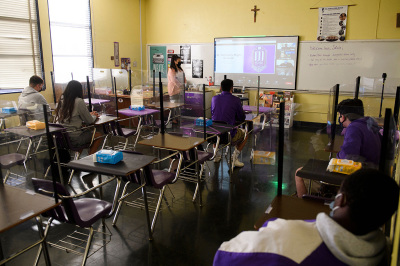How parents can be a force for change in their children's schools

Capitol Resource Institute created a useful parental checklist. It’s an important tool as you send your child back to school. The questions challenge school administrators and the curriculum choices that are made.
Parents deserve to have answers as students return to classrooms. I’ll get to the list in a moment, but I suggest more than a checklist; I advise involvement.
Before you go in with a demanding list of questions, be willing to volunteer. Be a teacher’s helper. Be an advisor for an after-school club. Get involved.
Our rural school district is not arguing about critical race theory. Nor are we battling comprehensive sex education. It’s not that those issues aren’t relevant in our small district, it’s that our community has surrounded the school with support that assures parents have a voice and some control over educational content.
Think of each school as its own community — and the parents have a valued place within it. While each school is unique, the goal is to educate students in a way that helps them become capable learners and future participants in their own communities. It’s not the den of indoctrination that many fear. Again, you can be a welcome volunteer right in the classroom.
Our rural students are surrounded by towering evergreen trees and pristine waters. They are learning about ecosystems and keeping our planet as healthy as possible. Our classroom education doesn’t involve a progressive, evil-minded curriculum, but a discovery of cause and effect as students learn how clear-cutting timber and building two huge dams on a major river caused severe impacts right where we live. Students are learning what can be done to preserve fresh water and endangered species.
As far as CRT, students have learned about the challenges faced by our nation’s minorities, but our students are living on what was formerly Pacific Coast tribal lands. Students are taught local history and about the cultures that cared deeply for the land and the Native American role in preserving life. We are not candy-coating the broken tribal treaties and the resulting abuse that has occurred on Indian reservations. Learning provides opportunities to make changes in attitudes now and policies later.
We may be rural, but we are not removed from society. Thanks to technology, our students are fully aware of the world’s temptations. Our teenage students also deal with wondering how they fit into this cyber world they soon will need to find their place in. The difference a school community can make is with our direct involvement. At our school, you will see parents, caregivers, retirees and many others serving students in a myriad of ways.
This is a change-making opportunity not exclusive to our community. This can happen anywhere people determine they want to make a difference. American public schools should be a church mission field. It is an open-door opportunity for those who have some extra hours to donate. While schools can be wary of those who have a “religious” agenda, I have spent over 30 years in classrooms, on school committees, building projects, fundraising, teaching life courses and tutoring. I have never had to preach; my actions speak for myself. Giving our time builds trust and relationships.
Here is the checklist, and my advice is to gather with other community members and become involved in your school. Don’t weaponize this checklist. Rather, use it as a guide as you get to know the teachers and staff and find ways to be part of your child’s school. You will make a difference now and impact a generation for the future.
Back to school checklist for parents by Capitol Resource Institute
- Find out what they are teaching for sexual education.
- Does the school district require teachers to attend equity or diversity training?
- Find out your rights regarding opting students out of controversial subjects.
- Learn what clubs are active on your child’s school campus.
- Find out if your school has a student newspaper and subscribe. There are often announcements, op-eds and advertisements in student newspapers concerning controversial matters on campus, such as a LGBT club activity, etc.
- Find out if the school has a student club for progressive activism. Get on their email list.
- Find out the school policy on restrooms, locker rooms and gender identity.
- Find out if your child can be released for confidential medical services without a parent’s knowledge.
Questions to consider while reviewing your student’s textbooks and learning materials
- Is it anti-parent? (Does it imply that parents are ignorant/old fashioned)
- Does it instruct the child to keep secrets from the parents?
- Does it encourage a negative view of the child, his family, his country or his future?
- Is it preoccupied with death, tragedy, hate, anger, revenge, etc.? (e.g., Requires the child to write out his own epitaph.)
- Is it anti-religion? Does it lead the child to reject morals and values taught at home or church?
- Does it lead the child to believe there are no absolute standards? (Morality is relative and depends on the situation)
- Does it encourage experimentation with sex, alcohol or drugs? Does it censor out all knowledge of the importance of religion in American history?
- Does it force the child to make choices based on hypothetical situations and decide if it is okay to lie, cheat, steal, kill, have sex outside of marriage, have an abortion or commit suicide?
- Does it force the child to answer questionnaires about the family’s attitudes, behaviors, customs and political views that invade privacy?
- Does it blur traditional concepts of gender identity and marriage?
Karen Farris saw the need to help underserved kids while serving in a youth ministry that gave her the opportunity to visit rural schools on the Olympic Peninsula. She now volunteers her time grant writing to bring resources to kids in need. She also shares stories of faith in action for those needing a dose of hope on her weekly blog, Friday Tidings.www.fridaytidings.com




























